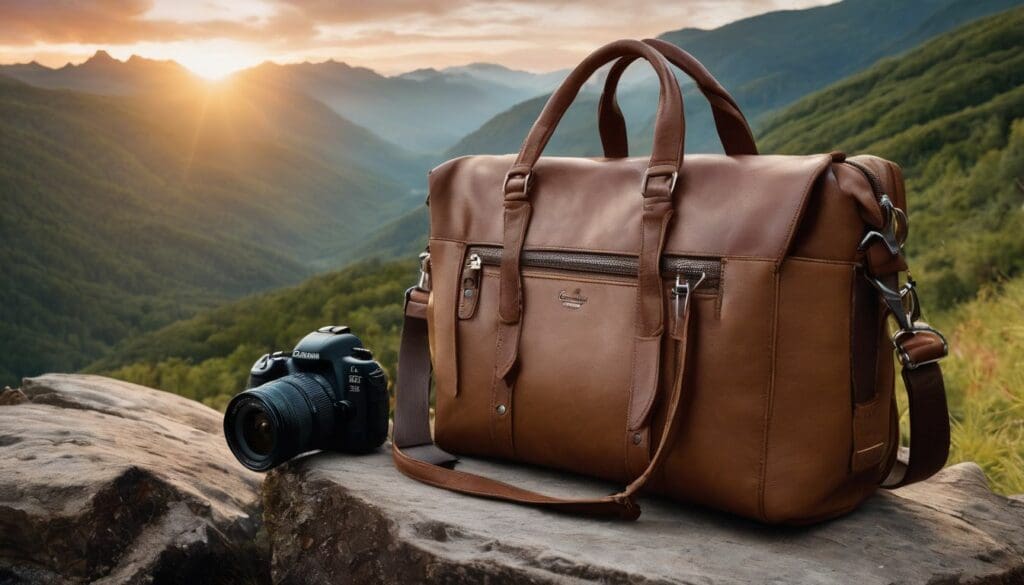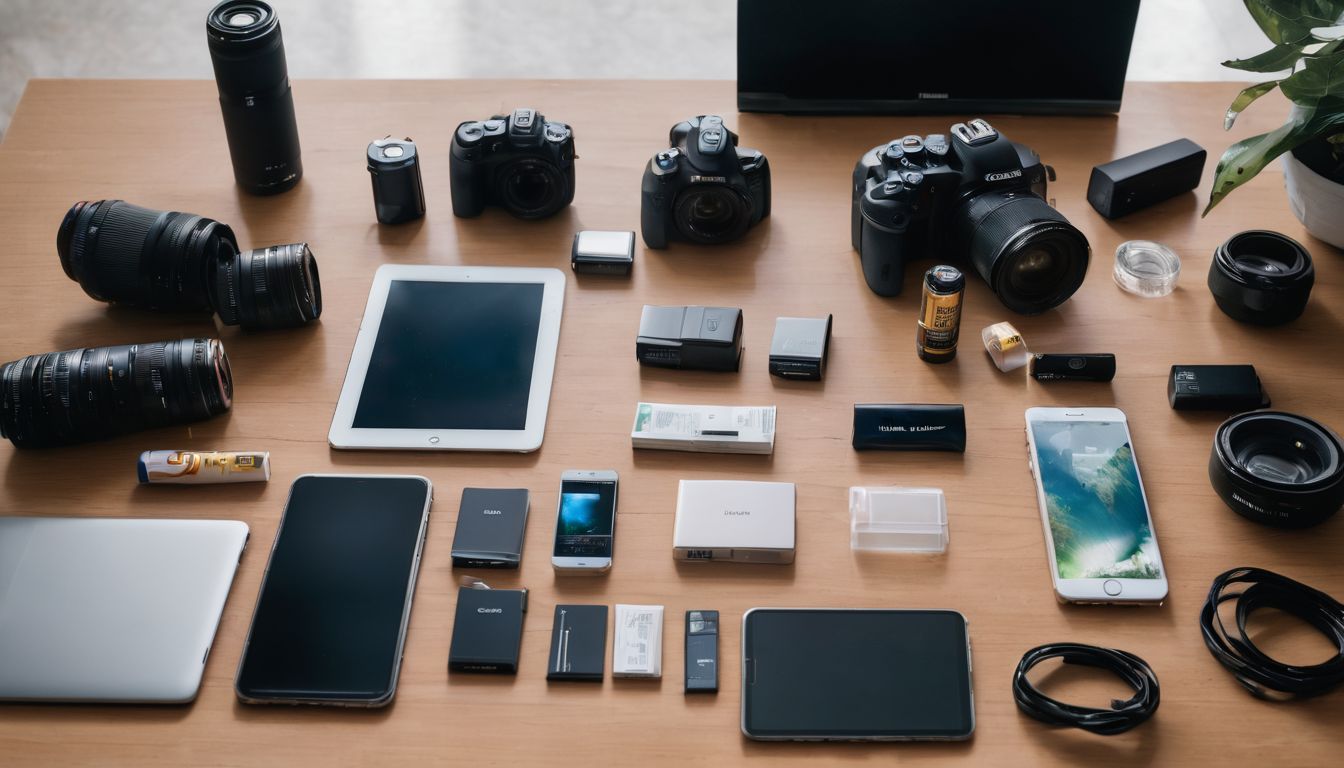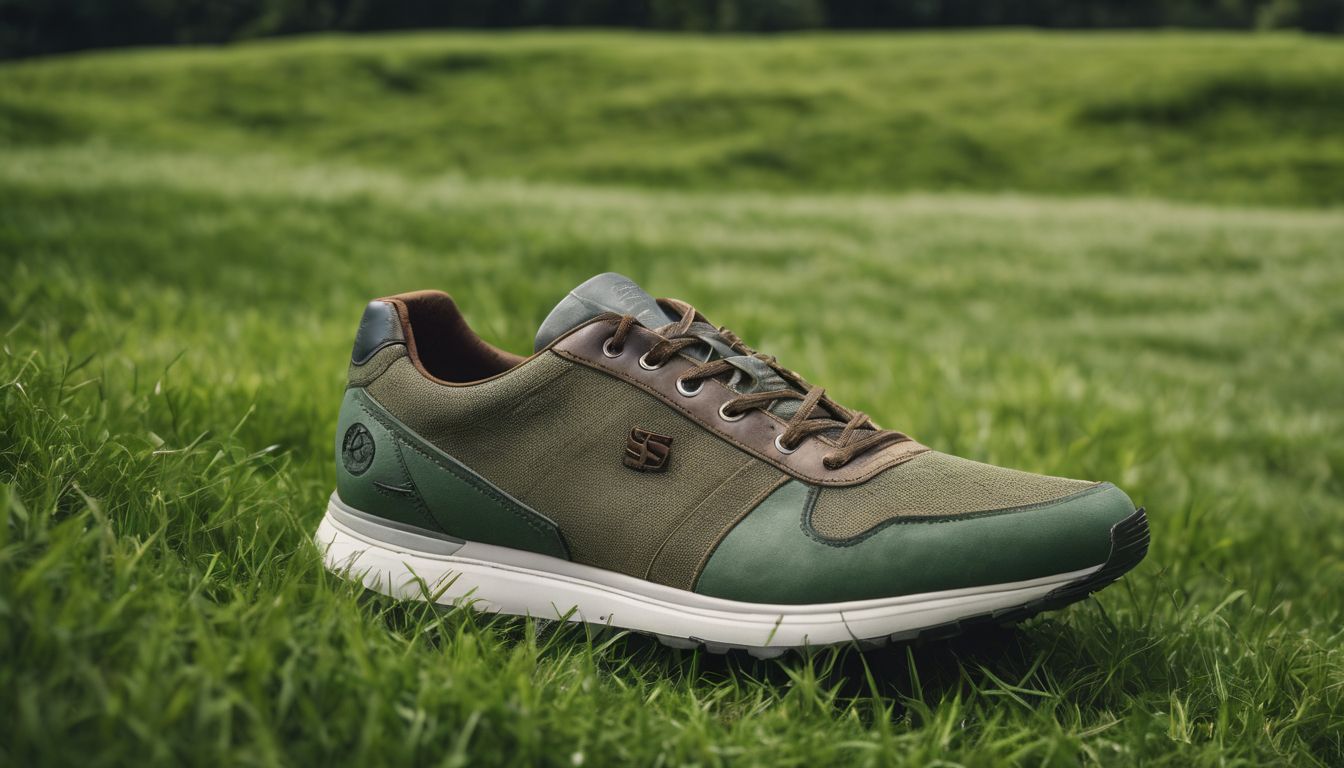It’s no secret that finding a handbag which marries style with sustainability can be quite the task. We’ve all too often come up against this very conundrum and were rather taken aback to learn about the fashion industry’s significant role in contributing to 10% of global carbon emissions.
Fueled by our dedication to make better choices, we rolled up our sleeves and delved deep into research. The result? A treasure trove of insights on selecting handbags that not only turn heads but also tread lightly on the earth.
Allow us to take you through a sophisticated journey where finesse gracefully aligns with environmental mindfulness.
Key Takeaways
- Choosing handbags from ethical brands like Sézane, Cuyana, and Stella McCartney means supporting sustainable practices and reducing environmental harm.
- Sustainable materials such as recycled leather and organic cotton in bag production minimise waste and pollution while promoting biodegradability.
- Checking for certifications like Fair Trade or FSC ensures the bags meet high environmental and ethical standards during production.
- Supporting fair trade principles helps protect workers by ensuring they are paid fairly and work in safe conditions.
- Educating others about the importance of eco – conscious fashion can influence a broader change towards more responsible consumption.
The Negative Impact of Fast Fashion on Handbags
Fast fashion has had a detrimental effect on the handbag industry, leading to environmental damage and the exploitation of workers. The production of cheap, fast fashion handbags often involves harmful chemicals, excessive waste, and unethical labor practices.
Environmental damage
We see the toll that handbag production can take on our planet. The creation of a single bag often leads to deforestation, water pollution and a significant carbon footprint. Leather processing, in particular, contributes to these issues with toxic chemicals contaminating water sources.
It’s urgent we shift towards ecoconscious accessories that respect the earth.
Our choices can drive change in the industry from exploiting natural resources to adopting sustainable practices. We must support brands that use recycled materials and cruelty-free alternatives for leather.
Ethical consumerism isn’t just a trend; it’s a commitment to prioritising environmentally responsible bags over throwaway fashion items. Together, we have the power to shape a future where sustainable fashion is the norm, backing innovations like vegan handbags and fair trade principles in manufacturing.
Exploitation of workers
Many fast fashion brands exploit workers in their handbag production, paying low wages and subjecting them to unsafe working conditions. This unethical treatment often involves long hours and limited job security, impacting the well-being of these workers.
Unfortunately, this exploitation also extends to child labour in some cases, highlighting the need for increased awareness of ethical manufacturing practices.
Sustainable and ethical handbag choices support fair trade principles and ensure that workers are treated fairly and provided with safe working conditions. By prioritising ethical brands that uphold responsible manufacturing practices, environmentally conscious individuals can make a positive impact on both the environment and the lives of workers involved in handbag production.
The Coach and Burberry Scandals
The Coach and Burberry scandals shed light on the destruction of unsold handbags and the harmful chemicals used in production. These incidents have sparked a growing demand for sustainable and ethical alternatives in the fashion industry.
Destruction of unsold handbags
Luxury fashion brands often resort to the destruction of unsold handbags, contributing to environmental and ethical concerns. This practice leads to a substantial waste of resources and materials that could have been repurposed or donated.
The use of harmful chemicals in the production process further exacerbates these negative impacts, affecting both the environment and the health of workers involved in manufacturing.
Additionally, this wasteful approach contradicts sustainable and eco-friendly practices, which aim to minimise environmental harm and promote responsible consumption. By supporting ethical brands that prioritise sustainability over mass production, consumers can actively contribute to reducing the destructive implications of excess inventory on both nature and society.
Harmful chemicals used in production
Many handbags are produced using harmful chemicals, which can have detrimental effects on the environment and human health. These toxic substances include dyes, solvents, and finishes that release pollutants into the air and water during production.
The overuse of these chemicals contributes to water and soil pollution and poses serious health risks to workers in manufacturing facilities. Ethical and environmentally conscious individuals should seek out handbags made with eco-friendly materials and processes to reduce their impact on the planet.
To create sustainable handbags, manufacturers are adopting innovative techniques such as vegetable-tanned leather or utilising recycled materials for fabricating bags. By supporting brands that prioritise non-toxic methods of production, we contribute to a cleaner ecosystem while advocating for responsible bag manufacturing practices.
Steps Towards Sustainable Handbags
To make a positive impact with your handbag choices, it’s important to opt for sustainable and biodegradable materials. Additionally, supporting ethical brands that prioritise fair treatment of workers and sustainable production practices is crucial in promoting a more environmentally friendly fashion industry.
Sustainable and biodegradable materials
Sustainable and biodegradable materials play a crucial role in reducing the environmental impact of handbag production. Brands like Sézane and Cuyana are leading the way by using recycled leather, organic cotton, and plant-based dyes to create environmentally friendly bags.
These materials minimise waste and pollution while also ensuring that the end products are biodegradable, thus contributing to a minimal environmental footprint.
Ecofriendly handbags made from sustainable materials such as pineapple leaf fibre (Piñatex) or apple leather offer ethical fashion accessories that are both stylish and environmentally conscious.
Supporting ethical brands
After considering sustainable and biodegradable materials, it’s essential to support ethical brands for environmentally conscious handbag choices. By choosing to purchase from ethical brands, we can ensure that the production process aligns with fair trade practices and prioritises workers’ well-being.
Look for handbag brands that are transparent about their sourcing and production methods, as well as those committed to using eco-friendly and cruelty-free materials. When selecting your next handbag, opt for companies that uphold ethical standards, contributing to a more sustainable and responsible fashion industry while supporting conservation efforts.
In addition to promoting environmental sustainability through purchasing decisions, it’s important to support businesses that prioritise ethically made products. By seeking out certified fair trade and environmentally friendly options, you can make a positive impact on both the fashion industry and our planet.
Luxury Sustainable Handbag Brands
When it comes to luxury sustainable handbag brands, there are a few standout names in the industry. Brands like Sézane, Cuyana, and Stella McCartney have gained recognition for their commitment to using sustainable materials and ethical production practices.
These brands offer a range of stylish and environmentally friendly options for those looking to make a positive impact with their handbag choices.
Sézane
Sézane offers a range of sustainable and ethically made handbags. The brand utilises environmentally friendly materials, such as vegetable-tanned leather and organic cotton, to create stylish yet eco-conscious bags.
By supporting Sézane, individuals can make a positive impact on the environment while also promoting ethical labour practices within the fashion industry.
Cuyana
Cuyana offers a range of sustainable and timeless handbags. Their commitment to using high-quality, eco-friendly materials ensures that their products have a minimal environmental impact.
Additionally, Cuyana focuses on creating long-lasting designs, reducing the need for excessive consumption and waste.
The brand’s dedication to ethical manufacturing means that workers are fairly compensated, and production processes adhere to strict environmental standards. By choosing Cuyana handbags, consumers can support sustainability while making a fashion-forward statement with their accessories choices.
Stella McCartney
Transitioning from the realm of sustainable luxury handbag brands, Cuyana offers sleek, timeless pieces that align with ethical and eco-friendly practices. Turning our attention to another pioneer in the industry, Stella McCartney’s commitment to sustainability shines through her line of handbags.
Using innovative and cruelty-free materials like vegetarian leather and recycled fabrics, Stella McCartney designs high-quality accessories that not only reduce environmental impact but also support fair trade practices.
Stella McCartney’s dedication to creating stylish yet sustainable handbags resonates with environmentally conscious individuals seeking fashion accessories that make a positive impact.
How to Make a Positive Impact with Your Handbag Choices
When it comes to making a positive impact with your handbag choices, consider shopping from sustainable and ethical brands, checking for certifications that guarantee ethical production practices, and spreading awareness about the importance of environmentally conscious fashion.
These small steps can lead to big changes in the industry.
Shopping from sustainable and ethical brands
When shopping for handbags, we can make a positive impact by choosing to support sustainable and ethical brands. By opting for environmentally conscious bags made from recycled materials or sustainable leather alternatives, we contribute to the conservation of natural resources and reduce our carbon footprint.
Supporting fair trade handbags also ensures that workers are paid fairly and work in safe conditions, promoting ethical practices within the fashion industry.
Choosing to purchase from sustainable luxury accessories brands such as Sézane, Cuyana, or Stella McCartney allows us to advocate for eco-friendly fashion without compromising on style.
As environmentally conscious individuals supporting conservation and environmental efforts, selecting sustainable and ethical handbag options aligns with our values while making a meaningful difference in the world of fashion.
Checking for certifications
When purchasing a sustainable handbag, look for certifications that verify the product’s ethical and environmental standards. Ensure that the bag is certified by recognised organisations such as Fair Trade or the Forest Stewardship Council (FSC) to guarantee that it has been produced with fair labour practices and sustainable materials.
Look out for relevant keywords such as “recycled,” “biodegradable,” or “cruelty-free” on the certification labels, indicating that the bag meets specific eco-friendly criteria.
Check if the handbag brand holds certifications from independent organisations like Global Organic Textile Standard (GOTS), which ensures environmentally responsible manufacturing processes.
Spreading awareness
After verifying the certifications of sustainable and ethical brands, we should commit to spreading awareness about the negative impacts of fast fashion on handbag production. Educating others on the environmental damage and worker exploitation caused by the fast fashion industry can encourage more people to make conscious choices when purchasing handbags.
We can advocate for sustainable materials and ethical production practices, influencing a shift towards eco-friendly and cruelty-free handbag options in the market. Sharing information about luxury sustainable handbag brands such as Sézane, Cuyana, and Stella McCartney can inspire others to support these environmentally friendly alternatives.
By sharing our knowledge about sustainable and ethical handbags with friends, family, and our community, we contribute to creating a more conscientious consumer culture that values sustainability over short-term trends.
Conclusion
In summary, choosing sustainable and ethical handbags supports a positive change in the fashion industry. By opting for brands that prioritise eco-friendly materials and fair labour practices, we contribute to a healthier planet and better working conditions for artisans.
Every purchase is an opportunity to make a difference – let’s embrace it!
FAQs
1. What makes a handbag sustainable and ethical?
A sustainable and ethical handbag is made from eco-friendly or recycled materials, produced without harming the environment or workers, often involving cruelty-free processes.
2. Can sustainable purses be fashionable and affordable?
Yes, there are affordable ethical bags that do not compromise on style, proving sustainable fashion accessories can be both chic and accessible.
3. Why should I choose recycled material bags over regular ones?
Choosing recycled material bags helps reduce waste in landfills because they recycle previously used materials into stylish new handbags that support sustainability.
4. Are all eco-friendly handbags also labelled as cruelty-free?
While many environmentally friendly handbags are also cruelty-free, it’s important to check if the brand specifically states their products haven’t been tested on animals or use animal-derived materials.





